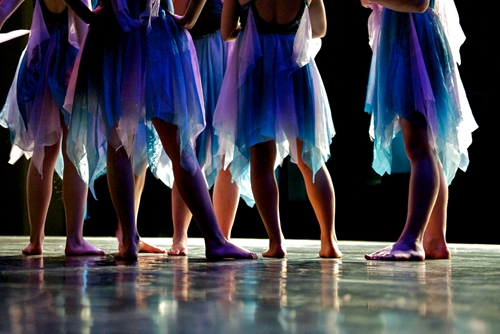Between ripped tights, performance missteps and glitchy audio, there are lots of things that can go wrong at a dance competition. Some issues you might see coming, like if a dancer is overly nervous and forgets her steps, while others may catch everyone off guard. Because some crises can strike without warning, it’s best to give your dancers a pep talk ahead of time. Here are a few tips to prepare your students for common problems they might face at the next dance competition.
1. Costume Malfunctions
Perhaps the most notorious of performance crises is the wardrobe malfunction. It might be something as small as a run in someone’s tights, but it could also be a broken strap, a loose tap shoe or a drooping tutu. The first thing you should do to prepare for any costume problems is have your competition survival kit handy. You’ll want to have extra tights, shoelaces, bra straps and double-sided tape, as well as a multipurpose tool to tighten taps.
Hopefully you were able to sort out any mid-performance costume issues during your dress rehearsal, but it’s a good idea to let your dancers know how to handle any unexpected problems. ISport Ballet recommended that dancers continue performing if there’s a minor wardrobe malfunction. It’s more distracting to the audience if a dancer is scrambling to fix a slipping strap than if she simply lets it hang. If you have serious concerns about the integrity of a costume, it might be a good idea to have dancers wear nude leotards underneath.
2. Forgetting the Steps
Stage fright is an all-too-real problem. If you have some novice dancers who seem a little shaky before their performances, you might be nervous that they will forget the steps. There are few things more upsetting for dancers than blanking in front of a large audience, so have a pep talk prepared in case this happens.
If your performers express concerns that they can’t remember the steps, Dance Advantage suggested that you remind them that their muscle memory will likely kick in once they relax. Try to get them thinking positive thoughts and assure them that their bodies will remember what to do once the music starts. Confidence is key when it comes to performing, so encourage your dancers to visualize success.
3. Making a Mistake
An occasional wrong step is often inevitable, but once in a blue moon, there will be a dancer who makes a noticeable mistake. Dance Spirit magazine noted that this is a fear of many students, as no one wants to let the team down. If this happens to your performers, it’s important to encourage a spirit of camaraderie among your dancers.
“This will happen to everybody on a team at some point,” Anne Smith, co-director of Hollywood Vibe, explained to Dance Spirit. “Everyone does the best they can and it’s important to keep each other motivated, uplifted and positive.”
Encourage your dancers to keep performing, even if there’s a major blunder. Have students support one another and pick up teammates who fall – literally or figuratively.
4. Messed-Up Music
Ask any studio owner and she’ll likely tell you that the only guarantees in life are death, taxes and technology malfunctions. If you’ve ever experienced a music mess-up at a dance competition, you probably know that it can catch even the most experienced performers off guard. Most teachers and judges agree that it shows professionalism and confidence when a team continues performing through music glitches.
“I had a group of novice Irish dancers whose CD froze on them halfway through their dance a few years ago,” one teacher explained on Dance.net. “Not one of them stopped or even hesitated … The adjudicator sent a message backstage saying how impressed she was with their performance.”
Instruct your students to keep dancing, no matter what’s going on with the sound.
5. An Imperfect Stage
There’s a reason that sports teams always want home-field advantage, and that’s because it’s where they’re comfortable. At a dance competition, when you’re performing on a stage you’ve never seen before, there’s always a chance it will be too sticky or slippery.
If you have concerns about the stage, instruct your dancers to use rosin before going on, and tell them to remain confident in their performance. Dance Spirit magazine noted that the risk of injury or mistakes is greater when dancers are moving tentatively because they’re afraid of the floor.


